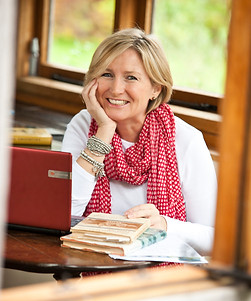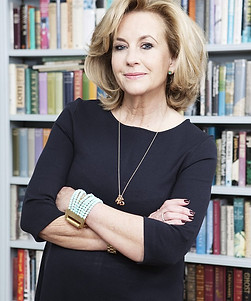What's your advice for
aspiring authors?
This is kind of a funny question for me – as I’ve actually put together three novel-writing courses full of advice for writers, along with numerous articles in our blog – take a look at www.curtisbrowncreative.co.uk. If I’m going to choose one piece of advice for here, it’s that great novels are made in the edit. When you get to the end of the first draft, it’s a great moment and a great achievement – but it’s also the beginning of an incredibly important stage in the process of writing a novel. Take your time over your editing and rewriting, and get your novel as good as you possibly can before you send it out.

Anna Davis
I have so much advice - soooo much - that I've created a coaching programme for writers, called Dream Author. There will soon be a snazzy website, but anyone who wants more information about it for the time being can email me at sophie@sophiehannah.com, with Dream Author in the subject line, and I will send you the brochure. And it's not only for aspiring authors - it's for writers at every level of experience. So far, lots of complete beginners have signed up and so have lots of bestselling writers. The aim of the programme is to help a writer at any stage of his or her writing journey remove the blocks and obstacles that they're putting in their own way. So, I'm going to be coaching people who have always longed to write but have never managed to find the confidence, and also people with no. 1 bestsellers to their name who are blocked because they're terrified they'll never get to number 1 again. All writers have dreams, but most get in the way of their own dreams to a significant extent by believing things that simply aren't true, and developing destructive thought habits.
That's why I created Dream Author - to address that issue and empower writers, because there's no need for anyone to feel discouraged or dispirited, and if they are feeling that way then something can be done about it - starting with a beautiful notebook that everyone who enrols on the programme is sent to do their Dream Author exercises in!

Sophie Hannah
This is always tough but the most important thing to realise is, this is a career. It has good days and bad days. It doesn’t happen instantly and on that journey it is best to remember publishing is a small world. My final piece of advise is listen to your work...text to voice software...hearing a computer read your words back to you with no inflection is a great way to edit!

Liz Fenwick
@emily_barr
Keep writing. Just carry on with it, even (and especially) when it’s going badly. If you write a bit every day, you will end up with a book: that’s just maths.

Emily Barr
I just got back from a writing retreat where there were a number of aspiring authors and the advice I gave them was this: Know exactly what you’re writing, where it fits, which authors you’re similar to and who your audience are. I spent a long time being unsure of this, and it was only when I figured it out that I became successful. You can’t just churn out what your soul or your subconscious tells you to write; not if you want to be read, anyway. That’s one of the reasons why it’s important to read contemporary books. Read as much as you can. Read bestsellers and debut novels. And if you don’t have time to read you don’t have time to be a writer.

Mark Edwards
Gill Hornby
Get on with it! Aspiration means nothing to anyone except you. All that counts to the rest of the world are your words on the page. Writer's block is a luxury you can't afford. On those mornings when you feel stuck, when there is no inspiration, just sit down and write something - anything. Give yourself the task of getting 300 words and you will find, by about the 150th, that something is working.... Writing brings down writing. The very act of it stirs the subconscious and you will begin to create.
And never give up. Take the misery of rejection, turn it into furious determination. And prove them all wrong.

Gill Hornby
I think it’s vitally important to listen. This means listening to the news, to conversations around you, to what is going on inside your head. Make sure you hear your characters, because they’re full of how to achieve the story you want to tell. If you don’t connect with them it can set you off on a tangent you don’t need to be on, or it can seize you up altogether. So, number one is the story, and joint no one belongs to the characters.

Susan Lewis
Not all authors stick to one genre, and there are various ways to keep writing and being successful. Greg Mosse is a great example of someone who has done this.
Greg Mosse
These days, I am a playwright. In the last five years, fifteen of my plays have been produced. Thirty-five years ago I wrote and produced plays in the London fringe. In between there was a long hiatus – bringing up children, supporting my wife Kate Mosse’s career, looking after elderly parents. At the same time, I worked in publishing – proof-reading, indexing, copy-editing and so on.

Greg Mosse
